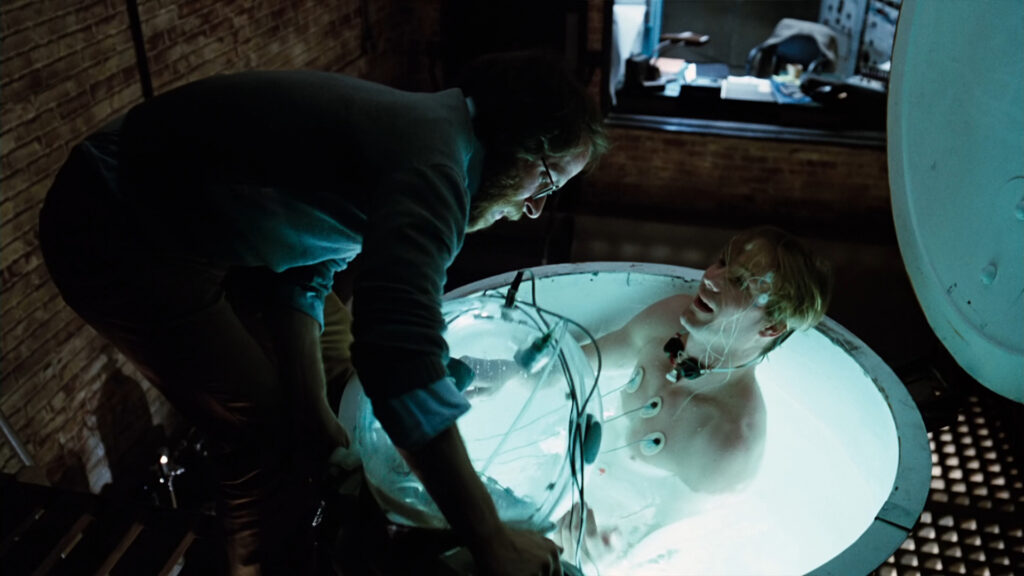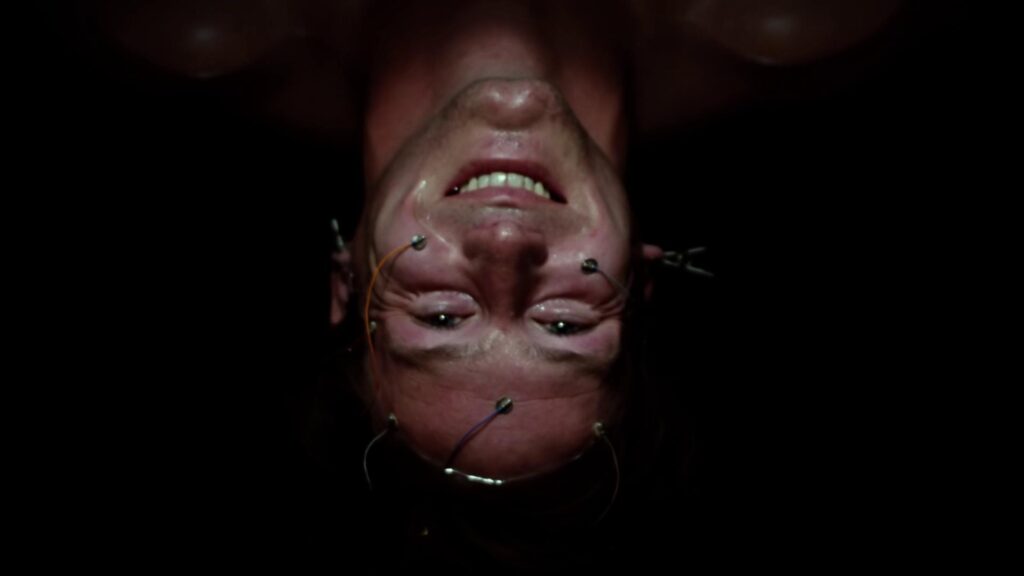| Kevin Obsatz |

Altered States plays on glorious 35mm at the Trylon Cinema from Friday, July 12th, through Sunday, July 14th. Visit trylon.org for tickets and more information.
How do you go from Network to Altered States?
According to a biography about the screenwriter of both films, Paddy Chayefsky (Mad As Hell by Paddy Considine), it sounds like life in New York in the mid-1970s was about as good as it can possibly get for a screenwriter. Paradise on earth. He and his best buddy Bob Fosse (director of Cabaret, All That Jazz) spent their days wandering the streets of New York smoking cigars, arguing about the meaning of life and art, and hanging out at the Carnegie Deli eating smoked meats.
Chayefsky’s penultimate film after a long career as a playwright, television writer, and finally in Hollywood, was Network—the kind of movie that seems like it was only possible in that pre-blockbuster era. It’s a fiercely literary film, a critical darling, a box office champ, and winner of seven Oscars. Get this: nominees for best picture in 1977, besides Network, were Taxi Driver, Rocky, All the President’s Men, and Bound for Glory. The Network team beat contenders like Ingmar Bergman, Liv Ullman, Sissy Spacek, Robert DeNiro, Jodi Foster, and Alan J. Pakula for awards.
Chayefsky was dead five years later, at the tender age of 58, of an aggressive cancer. The struggles of making Altered States, his final film, surely could not have been good for his health.
The thing that drew me to Chayefsky when I watched Network for the first time as a young man was his rendering of emotional catharsis through articulate outrage. Things are not alright, and somebody needs to say so. Throughout his writing career, from the early plays to the late screenplays, Chayefsky never seems to have a problem with conflict. His characters never shy away from an argument.
And then you get to Altered States, and, strangely, there’s… suddenly nothing to argue about.
We pass from the world of bombastic powerful men in his previous projects to a protagonist, Eddie Jessup, who spends most of the film alone and/or in the dark. We start out the film in a sensory deprivation chamber, and the film is structured around, essentially, four or five major “trips” into the darkness.
There is a remarkable lack of human drama around any of this. From the very beginning, Jessup is surrounded by people who are agreeing with him, helping him, and calling him a genius. On one level this is a relationship movie, but every beat in Jessup’s relationship with his girlfriend, then wife, then ex Emily is alarmingly frictionless. He seduces her by saying, “I’d like to go home with you tonight,” and her answer is, “why not right now?”
She asks him to marry her, and he says yes. They have kids, get separated and divorced, again without any drama, and… he goes to Mexico to take part in a shamanic ritual involving hallucinogenic mushrooms. All of that happens in first act, the first third of the script, 42 pages worth.
If this is a movie about a prophet (Jessup?), a (secular) holy man on a journey of (scientific) discovery, what is he struggling against? Where are his doubts, what are the obstacles? He seems to be given everything he needs at every turn. There are no human antagonists in his world, no bureaucrats or administrators getting in his way, nobody attempting to subvert his efforts or exploit his earnestly held beliefs.
Sure, Jessup is experimenting on himself in increasingly risky ways, and his colleagues and ex raise some degree of fuss about it, but he’s always able to do exactly what he wants, whether by convincing them or sneaking around behind their backs.
His infinitely supportive wife seems to have his number from the very beginning:
You’re… a Faust freak, Eddie. You’d sell your soul to find the great truth. Well, human life doesn’t have great truths. We’re born in doubt, and we spend our lives persuading ourselves we’re actually alive. One of the ways we know we’re alive is we love each other.
Chayefsky seems to be fairly upfront, in his biography, about basing his protagonists at least to some degree on himself. So it doesn’t seem farfetched to me that this character, this story, this very lack of conflict is a reflection of where Chayefsky finds himself at this stage in his career. To the degree that it is conquerable, he has conquered Hollywood. He has all the power and all the control that anyone, certainly any screenwriter, could possibly hope for. In a very real way, he seems to be yearning for conflict and unable to find it in his own life—he has good friends, a stable family, his pick of projects and collaborators.
What is a dyed-in-the-wool raging pessimist to do in this situation, with no mountains left to climb, nothing left to complain about, besides finally turn towards the inner darkness?
She insists she’s in love with me—whatever that is. What she means is she prefers the senseless pain we inflict on each other to the pain we would otherwise inflict on ourselves. But I’m not afraid of that solitary pain. In fact, if I don’t strip myself of all this clatter and clutter and ridiculous ritual, I shall go out of my fucking mind.
And all this power and control threatens to destroy him.
He goes into the darkness, and rather than struggle, he seems to soar. His consciousness ranges far and wide, to the beginning of time, he experiences tectonic shifts and the origins of life in the universe and comes back unstable in the most literal sense—prone to devolve, to explode in a whirlpool of light, to lose all sense of his shape and form. His dis-integration seems to infect his wife, so in the end they’re both in trouble and the solution is: each other—their love, their bond, is their only hope for remaining human, together. The last line of dialogue in the movie—and Chayefsky fought to make sure that it was contractually impossible for any of his dialogue to be changed—is: “I love you, Emily.”
I think that Chayefsky wished for so simple a resolution to his life of crisis and battle, dozens of plays and television scripts and movies worth of conflict. He wanted it to resolve with the idea that love is the meaning of life. Not just love—traditional, monogamous, patriarchal love with an adoring beautiful woman.
But the universe, or God, or fate, or his own subconscious, was never going to let him off that easy. Chayefsky was a major part of the process of selecting a director for his film, and somehow he managed to choose someone he wound up absolutely hating and loathing.
Network was directed by Sidney Lumet—not only a great director, with films including Dog Day Afternoon, Serpico, and 12 Angry Men under his belt, but, crucially, a very easy director to work with. Somebody who literally wrote the book about the collaborative filmmaking process (Making Movies by Sidney Lumet—highly recommended). Or Arthur Hiller, director of both The Hospital and The Americanization of Emily, previous successful collaborations with Chayefsky—Canadian, coming from television, and… easy.
Instead, they wound up with Ken Russell—a British director known for pushing the boundaries of sex on screen and for the recent success of the psychedelic rock opera Tommy with The Who. I guess I get the reasoning behind this choice. This film would contain a lot of hallucination sequences, so yeah, maybe Sidney Lumet’s not your automatic choice. Imagining Paddy Chayefsky—the very archetype of a crabby East Coast Jewish Intellectual—somehow choosing this 70s sex drugs & rock’n’roll Brit libertine as a collaborator… it just sounds like a terrible match on every level.

Consensus seems to be that both men were a pain in the ass throughout the filmmaking process. I read a biography of Chayefsky, which, though it takes his side, paints him as paranoid, irrational and despondent throughout the process. First complaining loudly on-set, trying to get Russell fired, and eventually banishing himself for his own psychological health all the way back to New York.
Ken Russell sounds like an abusive asshole, but if I try, I can definitely imagine the situation from his point of view. Because like I said, this script, though it has moments of beauty and brilliance, is fundamentally almost conflict-free. There’s not much drama in a man floating in the dark and dreaming about the beginnings of the universe. It’s a tract, really, a manifesto, a philosophical inquiry, not a story. A string of almost experimental movies strung together with scientific musings.
I think it’s possible that Chayefsky needed to hire a director to play the meta-role of the Chayefsky protagonist—the lone voice of dissent crying out in the wilderness that, hey, this doesn’t work. Chayefsky has almost all the power in this scenario, he is the institution, he’s the boss. Maybe the movie that he thought he was writing has a simple ending:
My God, do you think you’re the only one who has experienced despair? The only one who has experienced the nothingness of life? We are all creatures of despair, Eddie. Life for all of us is a flight from the unspeakable terror. Life is an act of faith for all of us! That’s why we love each other. It’s the only act of faith most of us are capable of.
Faith in love as a defense against existential terror and despondence. It would be great if it were that simple—but based on Chayefsky’s life, I don’t think that wasn’t enough for him. He had a loving wife, by all accounts, but he was never content to sit at home, earn a paycheck, play with his kid, go to temple. He had plenty of money but he was uninterested in moving out of the heart of the daily struggle of New York City. He had great directors at his fingertips (Fosse! What about him?) but he needed, somehow, to make a much harder choice.
He needed conflict, he needed a good fight, he needed to be oppressed, somehow, perversely, to be happy. The battle can come from anywhere. In Marty (Oscar #1) it was Marty against the expectations of his family and friends. In The Hospital (Oscar #2) it was Dr. Bock vs. the entire corrupt and dysfunctional medical establishment. In Network (Oscar #3) it was Max and Howard against the Network and the Entertainment Industry. In Chayefsky’s play Gideon the antagonist is God himself, through his emissary “The Angel of the Lord.”
In Altered States, it could be any of these, or a combination of them. Eddie is described early on, by Emily, as a Faust freak—but Faust, in all of his incarnations, had the literary advantage of getting to summon an actual demon to contend with.
I think that Chayefsky thought it would work dramatically, as a metaphor for existential crisis and depression, to have his character contend with the great void of meaning at the heart of the universe itself. But when it came down to it in real life, he had no choice but to summon for himself an actual demon in the flesh—in the form of Ken Russell—in order to complete the cast of meta-characters of his final production.
Edited by Olga Tchepikova-Treon
